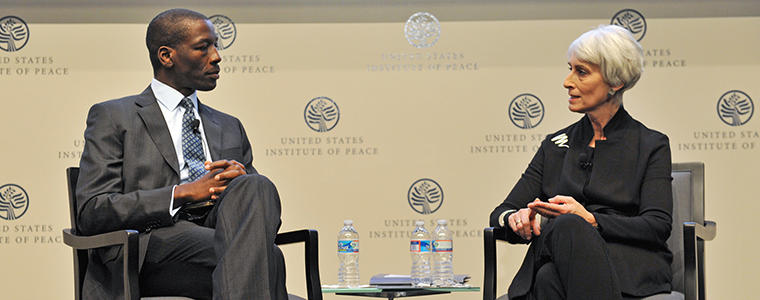As six of the world’s ten fastest growing countries are in sub-Saharan Africa, the United States must help develop the potential and strengthen mutually beneficial partnerships with African nations, Undersecretary of State for Political Affairs Wendy Sherman told a packed auditorium at the U.S. Institute of Peace on March 28.

As six of the world’s ten fastest growing countries are in sub-Saharan Africa, the United States must help develop the potential and strengthen mutually beneficial partnerships with African nations, Undersecretary of State for Political Affairs Wendy Sherman told a packed auditorium at the U.S. Institute of Peace on March 28.
The undersecretary spoke at the Institute just having visited two of those fastest growing countries – Angola and Nigeria – and three other nations – Zambia, Malawi and Kenya – where she witnessed the impacts of such change firsthand.
Amid such dramatic growth come dramatic challenges to ensure that good governance accompanies the economic development. As Sherman quoted President Obama from his speech in Accra in July 2009, “development depends on good governance.”
In order to meet the challenges inherent with such fast growth, the region needs a holistic policy approach, she said. Sherman spoke how “secure environments, sustainable poverty reduction, better infrastructure, transparency, accountability, vibrant civil societies, and effective and accountable security forces are also elements essential for success.” The United States and its partners, she said, are helping define, initiate and establish the necessary reforms and policies.
Indeed, USIP has been on the ground in a number of countries -- such as Liberia, Democratic Republic of Congo, Kenya, Nigeria and Sudan – developing and implementing programs to strengthen the rule of law, code of business ethics, democratic governance and civil society. She praised the democratic progress in countries like Senegal, which recently held peaceful and fair elections, and expressed concern regarding setbacks in other countries like Mali, where soldiers recently drove the president into hiding.
Sherman said the U.S. views the recent developments in Mali as a setback for the country’s long history of democracy, but is heartened by ECOWAS [the Economic Community of West African States] steps to assist the country – a real statement about the strength of the regional institutions.
Despite the economic growth, conflicts and security challenges remain. “As we have most recently seen in Mali, militaries can threaten decades of democratic gains,” Sherman said, underscoring the importance of having professionalized militaries that can be held accountable by the rule of law.
“That is why a critical component of our engagement with Africa is to help African countries develop professional militaries to provide for the national defense of sovereign states and the safety of the populace while respecting civilian authority,” Sherman said.
At the same time, she noted how African militaries have also played a positive role in the continent’s democratization, with African peacekeepers, for example, contributing to the rebuilding of war-torn countries.
As such, USIP actively assists in the State Department’s Africa Contingency Operations Training and Assistance (ACOTA) program, teaching conflict mediation and negotiation techniques for African security personnel for peacekeeping missions across the continent.
Raymond Gilpin, director of USIP’s Center for Sustainable Economies, says, “Over the last decade more African countries have consolidated democratic values and more African economies have grown consistently than during any time in recent history. Although significant challenges remain, African countries present significant opportunities for investment and commerce and could potentially be reliable and capable allies in the quest for world peace.”
Amid attempts to trim foreign affairs budgets and development assistance funds, the U.S. has a good reason to maintain its strategic interest and partnership with Africa:
“The United States must engage African countries as it seeks to do business in some of the fastest growing markets, ensure access to strategic natural resources (with a significant proportion of new oil finds are in Africa) and forge links to combat extremism and violent conflict,” Gilpin says.